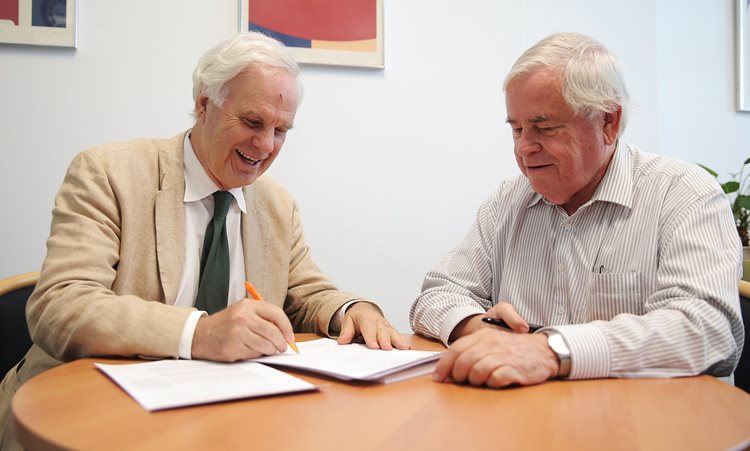April 5, 2018 Print
A new Material Transfer Agreement will accelerate research collaborations between the Westmead Institute and the Western Sydney Local Health District.
 Professor Tony Cunningham (WIMR) and Professor Stephen Leeder (WSLHD) announced the new agreement.
Professor Tony Cunningham (WIMR) and Professor Stephen Leeder (WSLHD) announced the new agreement.
A new Material Transfer Agreement (MTA) will accelerate research collaborations between the Westmead Institute for Medical Research and the Western Sydney Local Health District (WSLHD).
Professor Stephen Leeder, Director of the Research and Education Network, WSLHD, together with Professor Tony Cunningham, Executive Director of the Westmead Institute, announced the new agreement, which will replace individual study-based MTAs to facilitate the prompt exchange of research specimens.
Professor Cunningham said this would significantly shorten the process for researchers transferring materials and speed up the vital work of the Institute.
“Transferring research specimens is an essential part of scientific progress.
“Up until now, researchers have had to submit an individual agreement for each study; a time-consuming process that can significantly delay research.
“Under this new agreement, researchers will no longer have to negotiate individual MTAs for each research project.
“This will help researchers access the materials they need, so they can get on with their important work of tackling some of the world’s biggest health issues,” Professor Cunningham said.
A material transfer agreement governs the transfer of research materials between organisations. The new agreement covers the transfer of biological materials such as antibodies, cells, proteins, blood and other tissues where a WSLHD patient has consented to participate in multi-site research projects conducted at WIMR and hospitals across the WSLHD (Westmead, Blacktown, Mt Druitt and Auburn).
Professor Leeder is optimistic the MTA will encourage further translational research to take place on the growing Westmead campus.
“This agreement is an important step towards further strengthening the existing collaborative relationship between the Institute and the WSLHD.
“This important agreement will help to speed up research, which means we can turn scientific discoveries from the Westmead Institute into better medical care for our patients and the people of Western Sydney.
“We are committed to continuing to work with the Westmead Institute to facilitate translational research across the Westmead campus,” Professor Leeder concluded.
Researchers wishing to transfer samples to a third party will still need to contact the WIMR Governance Office at governance@westmeadinstitute.org.au or the WSLHD Research Governance Office at WSLHD-researchoffice@health.nsw.gov.au